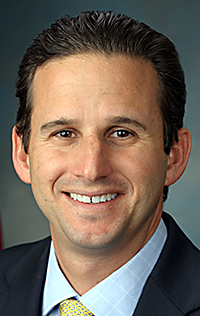Schatz: ‘We need to act fast’ to fight dengue, Zika
U.S. Sen. Brian Schatz called Thursday for a swift response to Hawaii Island’s dengue fever outbreak.
ADVERTISING
In a meeting with Dr. Thomas Frieden, director of the federal Centers for Disease Control and Prevention, Schatz discussed efforts to fight off the current dengue outbreak, as well as the threat of the Zika virus, which has emerged during the past few weeks as a pressing concern for health officials worldwide.
“Dengue is a public health emergency on Hawaii Island,” Schatz said in a statement. “With the emerging threat of a possible Zika crisis, we need to act fast. There is no doubt we need additional funding, but we also need the CDC’s commitment to address dengue and the threat of Zika simultaneously in Hawaii.”
Dengue and Zika are carried and transmitted to humans via species of mosquitoes that can be found on the Big Island. So far, only locally transmitted cases of dengue have been found on the Big Island, but in January a baby born with a birth defect on Oahu was linked to the Zika virus. The baby’s mother previously traveled to Brazil, where cases of Zika exploded in recent months.
During a Senate Appropriations Committee hearing Thursday, Schatz called for “quick approval of additional funding,” according to the statement, while urging Frieden to coordinate with the state and county to improve mosquito control programs to help stop the spread of dengue and Zika.
Last week, he joined 45 Senate Democrats in signing a letter to President Barack Obama calling for a response plan to address the spread of the Zika virus at home and abroad. On Monday, Obama asked Congress for $1.8 billion to combat Zika.
Schatz’s appeals echo similar sentiments expressed about two weeks ago by U.S. Rep. Tulsi Gabbard, D-Hawaii, when she criticized Gov. David Ige’s response to the dengue threat on Hawaii Island and called for him to declare a state of emergency.
Days later, Ige defended himself, saying he relied on Hawaii County officials to make that decision, but up to that point Mayor Billy Kenoi and Hawaii County Civil Defense had not requested a state emergency declaration.
However, when Kenoi declared a state of emergency for the county this Monday, Ige responded saying he would only declare a state emergency if any of five specific conditions were met: the outbreak requires additional resources beyond current levels, the outbreak spreads to other islands, the outbreak expands to include Zika and other vector-borne diseases, if it becomes necessary to waive certain laws and regulations or if the state determines it will need federal assistance.
Hawaii Island and state health officials have wrestled with the dengue outbreak since late October. Civil Defense Administrator Darryl Oliveira has said repeatedly that while the county currently has the resources it needs to fight the outbreak, any further outbreaks or additional strains on vector control equipment and manpower could adversely affect future response.
Recent fears regarding the deepening outbreak of Zika virus in countries across the Americas have spurred many on the Big Island to call for a stronger response to disease-carrying mosquitoes in Hawaii.
According to the CDC, about 1 in 5 people infected with the Zika virus actually become ill, with symptoms including fever, rash, joint paint or red eyes.
“The illness is usually mild with symptoms lasting for several days to a week,” reads a CDC webpage about the disease.
However, health officials warn of a close link between Zika virus and a condition found in newborn babies called microcephaly, characterized by unusually small skulls and brains, which can result in disability or death.
Email Colin M. Stewart at cstewart@hawaiitribune-herald.com.


